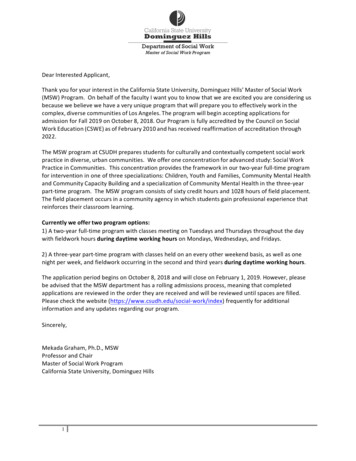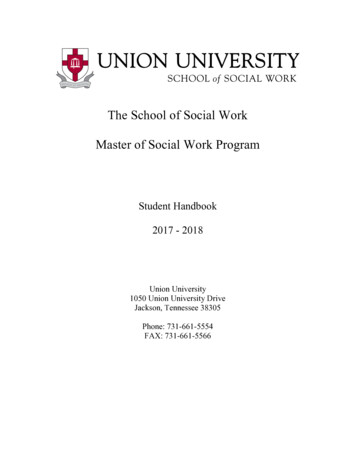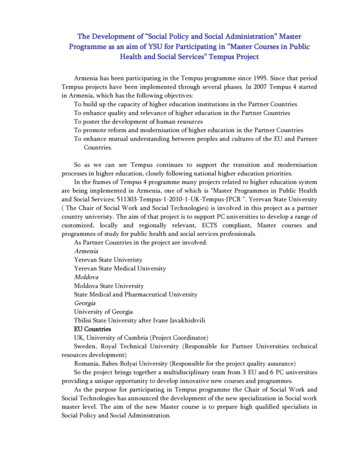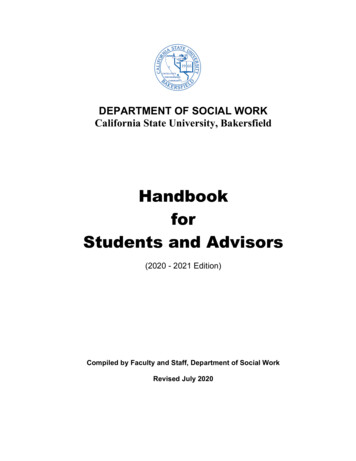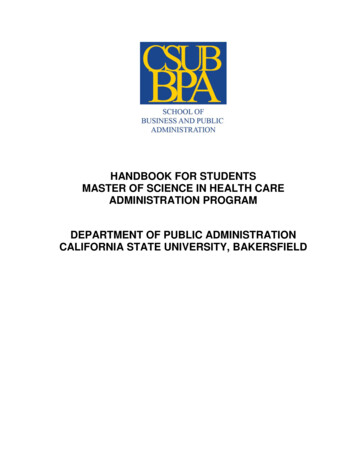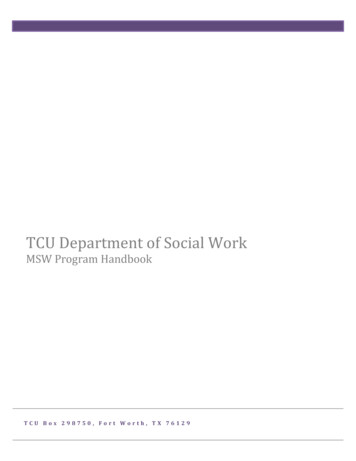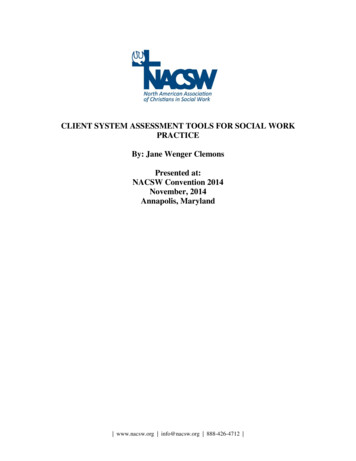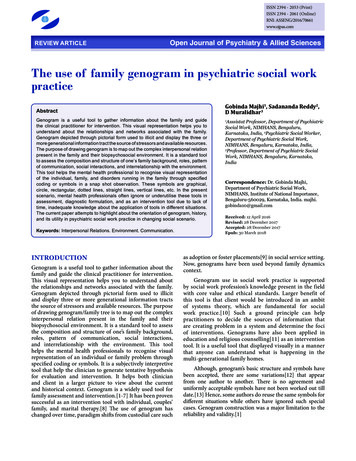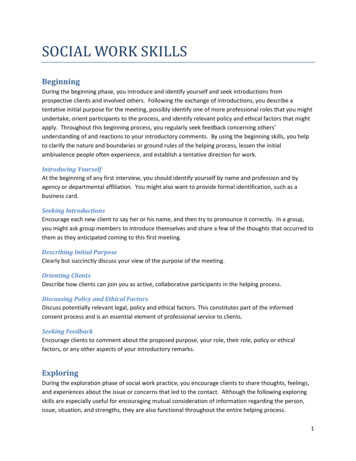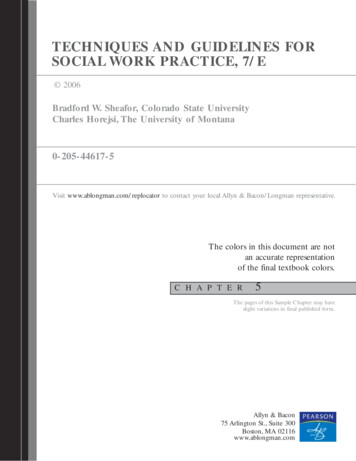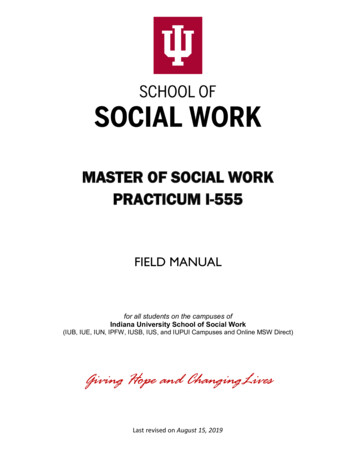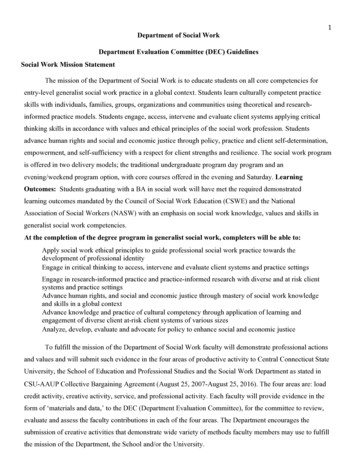
Transcription
1Department of Social WorkDepartment Evaluation Committee (DEC) GuidelinesSocial Work Mission StatementThe mission of the Department of Social Work is to educate students on all core competencies forentry-level generalist social work practice in a global context. Students learn culturally competent practiceskills with individuals, families, groups, organizations and communities using theoretical and researchinformed practice models. Students engage, access, intervene and evaluate client systems applying criticalthinking skills in accordance with values and ethical principles of the social work profession. Studentsadvance human rights and social and economic justice through policy, practice and client self-determination,empowerment, and self-sufficiency with a respect for client strengths and resilience. The social work programis offered in two delivery models; the traditional undergraduate program day program and anevening/weekend program option, with core courses offered in the evening and Saturday. LearningOutcomes: Students graduating with a BA in social work will have met the required demonstratedlearning outcomes mandated by the Council of Social Work Education (CSWE) and the NationalAssociation of Social Workers (NASW) with an emphasis on social work knowledge, values and skills ingeneralist social work competencies.At the completion of the degree program in generalist social work, completers will be able to:Apply social work ethical principles to guide professional social work practice towards thedevelopment of professional identityEngage in critical thinking to access, intervene and evaluate client systems and practice settingsEngage in research-informed practice and practice-informed research with diverse and at risk clientsystems and practice settingsAdvance human rights, and social and economic justice through mastery of social work knowledgeand skills in a global contextAdvance knowledge and practice of cultural competency through application of learning andengagement of diverse client at-risk client systems of various sizesAnalyze, develop, evaluate and advocate for policy to enhance social and economic justiceTo fulfill the mission of the Department of Social Work faculty will demonstrate professional actionsand values and will submit such evidence in the four areas of productive activity to Central Connecticut StateUniversity, the School of Education and Professional Studies and the Social Work Department as stated inCSU-AAUP Collective Bargaining Agreement (August 25, 2007-August 25, 2016). The four areas are: loadcredit activity, creative activity, service, and professional activity. Each faculty will provide evidence in theform of ‘materials and data,’ to the DEC (Department Evaluation Committee), for the committee to review,evaluate and assess the faculty contributions in each of the four areas. The Department encourages thesubmission of creative activities that demonstrate wide variety of methods faculty members may use to fulfillthe mission of the Department, the School and/or the University.
2MentoringNew tenure-track faculty members to the Department will be assigned a mentor or givenopportunities to select senior faculty who will serve as resources and guides to the Department, Universityand to assist in the development of professorship skills and competencies within the academy. Thementoring will be provided by a volunteer senior faculty who will arrange to meet with each new nontenured full-time faculty member a minimum of once per month during the academic year to discussissues of concern or interest (e.g. faculty activities on campus, advising, load credit, curriculum, tenureand promotion portfolio, scheduling, budget, travel, etc.). Mentoring will be provided in informal andopen group meetings with the non-tenured faculty. Additionally a new tenure track faculty member mayrequest a mentor from among the tenured associate or full professors outside of the Department whovolunteer to serve in such capacity. A list of volunteers will be available from the DepartmentChairperson. In addition, non-tenured faculty members will be encouraged to seek informal guidance fromother faculty in the academy as desired.I.Expectations of Faculty for Tenure, Associate Professor and Full ProfessorFaculty will teach courses within the social work department and will teach electives in theirarea of expertise: “Instructional Load Credits” (Article 10.2 p. 67). Please see Section II item Aof this document and the CSU- AAUP Collective Bargaining Agreement, August 25, 2007August 25, 2016 for: “Other Load Credit Activity,” “Specialized Assignments” (Article 10.4, p.68); “Reassigned Time (Article 10.6 p. 70); “Reassigned Time for Curriculum Development,Faculty Development, and Instructional Enhancement” (Article 10.6.5) “Reassigned time forSupported Research” (Article 10.10, p. 74) (CSU- AAUP Collective Bargaining Agreement,August 25, 2007-August 25, 2016).Faculty will engage in creative activities appropriate to their field and professional goals.4.11.9.2 Creative activity appropriate to one’s field, such as delivering papers at professionalconferences, production/performance of artistic works, research, study and publication (CSUAAUP Collective Bargaining Agreement 2007-2016, p. 26).Faculty will advise and mentor students by providing academic and professional informationthat facilitate student success in developing social work competencies, skills, ethics and valuesbased on the mandates of the Council on Social Work Education (CSWE) and the NationalAssociation of Social Workers (NASW).Council on Social Work Education (2015) Educational Policy and Accreditation Standards“Social work educators serve the profession through their teaching, scholarship, and service.Social work education at the baccalaureate, master’s and doctoral levels shapes theprofession’s future through the education of competent professionals, the generation ofknowledge, the promotion of evidence-informed practice through scientific inquiry, and theexercise of leadership within the professional community. Social work education is advanced bythe scholarship of teaching and learning, and scientific inquiry into its multifaceted dimensions,processes, and outcomes” (CSWE 2015, p. 1)Educational Policy 3.2 – Faculty“Faculty qualifications, including experience related to the Social Work Competencies, an
appropriate student-faculty ratio, and sufficient faculty to carry out a program’s mission andgoals, are essential for developing an educational environment that promotes, emulates, andteaches students the knowledge, values, and skills expected of professional social workers.Through their teaching, research, scholarship, and service – as well as their interactions withone another, administration, students, and community – the program’s faculty models thebehavior and values expected of professional social workers. Programs demonstrate that facultyis qualified to teach the courses to which they are assigned” (CSWE 2015. P.13).3Faculty will contribute their expertise and knowledge to the development of students, theDepartment, the University and the larger community and profession adhering to NationalAssociation Code of Ethics (2008):o “The mission of the social work profession is rooted in a set of core values. There corevalues, embraced by social workers throughout the profession’s history, are the foundationof social work’s unique purpose and perspective:o Serviceo Social justiceo Dignity and worth of the persono Importance of human relationshipso Integrityo CompetenceThis constellation of core values reflects what is unique to the social work profession. Corevalues, and the principals that flow from them, must be balanced within the context andcomplexity of the human experience” (NASW Code of Ethics, 2008).Full-time, untenured, tenure track faculty will annually prepare a portfolio of documents forreview by the Department Evaluation Committee that demonstrates the candidate’s on-goingactivities and substantive accomplishments in load credit activity, creative activity, service andprofessional activity.Faculty seeking tenure will prepare a portfolio of documents that demonstrates the candidate’songoing activities and substantive accomplishments during years at CCSU and during anyprofessional period for which years toward tenure were granted on initial appointment. Toreceive a commendatory assessment by the DEC, candidates should meet expectations in allareas and/or demonstrate significant growth in skills and activities overtime. Please see SectionII, page 4 of this document for “Materials as Evidence in each of the Four Areas of ProductiveActivity” and Table on page 7, “Tenure.”Faculty seeking promotion to Associate Professor will prepare a portfolio of documents thatdemonstrates the candidate’s on-going activities and substantive accomplishments during yearsin current rank. To receive a commendatory assessment by the DEC candidates should meetexpectations in all areas. Candidate must also demonstrate sufficient history of accomplishmentsand commitment to continue to be engaged as a teacher, scholar and professional. Please seeSection II, page 4 of this document for “Materials as Evidence in Each of the Four Areas ofProductive Activity” and Table on page 6, “Associate Professor.”
4Faculty seeking promotion to Professor will prepare a portfolio of documents that demonstratesthe candidate’s ongoing activities and substantive accomplishments over career and especiallyduring years in current rank. Portfolios and curricula vitae should be clearly organized withdifferent categories and subcategories of activity clearly delineated and listed. Candidates areencouraged to discuss portfolio organization with Department Evaluation Committee members,especially in cases in which there is uncertainty as to where to list an activity. To receive acommendatory assessment by the DEC candidates should meet expectations in all areas. Facultymust also demonstrate sufficient history of accomplishments and commitment to continue to beengaged as a teacher, scholar and professional. Please see Section II, page 4 of this document for“Materials as Evidence in each of the Four Areas of Productive Activity,” and Table on page 7,“Full Professor.” Materials submitted must be submitted in a timely manner according to the CSUAAUP timetable. Please see Appendix table 1 noting the Evaluation Process Due Dates obtainedfrom Collective Bargaining Agreement, (CSU-AAUP Collective Bargaining Agreement 2007-2016,p. 23).
5II. Materials as Evidence in Each of the Four Areas of Productive ActivityThe faculty is expected to be productive in four areas: load credit activity, creative activity, service andprofessional activity. The lists of material evidence are identified specific to the Department of social workand the profession of social work.A. Load Credit ActivityTeaching:Course material (e.g. handouts, exams, worksheets, assignments)Syllabi and/or curriculum proposals for newly developed electives or revised coursesOverview of courses taught (e.g. class size, level, departmental requirement, elective, multiplepreparation of diverse core courses and/or electives)Explanation of teaching innovationsNew courses(s) introducedSpecial projects developed for teaching purposesStudent opinion surveys (numerical/averaged)Student opinion surveys (copied with original comments/typed for clarity)Statement of teaching philosophyStatement of teaching goalsExplanation of efforts taken to improve teachingPeer evaluations based on classroom visits or collaborationsCurriculum development and/or other teaching-related grantsLetters from students or alumniTeaching awards or nominationsTeaching excellence presentationsOther Load Credit Activity:Administrative responsibilities for which reassigned time was providedAssessment activities for which reassigned time was providedResearch activities for which reassigned time was providedSabbatical leaveAdditional appropriate materials to evaluate non-teaching load credit, such as reassigned time,field education coordinator, evening/ weekend program coordinator or department chairpersonB. Creative ActivityApplications of researchArticles and book chapters (peer-reviewed, non-peer-reviewed)Evidence of scholarship agenda, research agenda, publications presentationsConference presentations, chair conference, panel memberConference proposalsGrant proposals & grant awards such as AAUP University Research Award, SEPS Research Reassigned time award
CSU/CCSU Trustee Research Award, CCSU Faculty Development, CSU/AAUP Research GrantExternal Funded GrantsInternal Funded GrantsResearch reports to external sponsorsOngoing creative activity program or programsJournal publications specific to social workBook contract related to social workPublished book or chapter related to social workEdited VolumesEditorship of professional journal or newsletter in social workSubmitted manuscripts or grant applications (with explanation of current stage)Work in progressLetters of support from scholars in the field6C. Productive Service to the Department and University ActivityDirect Service:Academic advising, Overview of academic advising (e.g. number of students advised, academicassistance)Administrative support work (e.g., school-wide governance, admission reviews, accreditation andassessment work, student portfolio reviews)Contributing to re-affirmation self-study, assessments, narratives or other accreditation materialsContributing to required Department reports, developing mentoring guidelines, peer evaluation andteaching observations, and website maintenanceCommittee work at Department, School, University, and System levels; service as a committeeofficer should be notedInvolvement with student organizations, residences, etc.Mentoring junior faculty in the DepartmentOverview of student professional and academic development and support, e.g. mentoring, assistingstudents with applications for jobs or graduate schools, promoting student research, promotingstudent presentations in public settings, conferences or panelsContributions to enhance equal opportunity and diversity on campusInvolvement with Department student organizations (e.g. faculty advisor to Social Work Club or PhiAlpha)Representing the Department at University Open Houses and other campus eventsAssisting in departmental assessment of student outcomesInvolvement in extracurricular activities, including bringing guest speakers to campus, or organizinga conference or a panel presentation or participating on a panel or conference on campusOrganizing or participating in off-campus and/or off-hours activities for students or faculty to promotestudent learning, civic engagement (e.g. lobby training with NASW, government or political events) orto provide a community serviceInvolvement and/or collaboration with interdisciplinary programs within the school and UniversityParticipating on advisory councils, boards, steering committees or other university boards orcommunity boards for interdisciplinary programs or for social work professional programs orinitiativesBuilding field agency collaborative relationships to enhance student learning in the professionService as a representative of CCSU (limited to activities that use the faculty’s professionalexpertise):Expert witness testimony
Outreach and service to schools and other educational organizationsParticipation in community affairsServices to agencies, public and private organizationsService to citizen/client groupsService to government agenciesService to accrediting body (e.g. committee work or position with Council on Social Work Education[CSWE] or National Association of Social Work, [NASW] at the state, and/or national level ormembership in NASW – Black or NASW Latino chapters)7D. Professional ActivityActive participation in professional and learning opportunities within the social work professionAttending Conferences or SeminarsChairing conference sessions or serving as a discussantMembership in NASWMembership in Association of Baccalaureate Social Work Program Directors, Inc. (BPD)Organizing conferences on campus, in community, state or national levelServing on conference communitiesServing as an elected official in social work organizations, state or national level (e.g. CSWE orNASW)Organizing sessions in conferencesServing as a peer reviewer or juror for journals or granting agenciesServing as an editor for a journalServing as a member of a social work awarding committeeServing as board or committee member in the larger community as a representative of CCSU and/oras a Social Work Faculty, Social Work Advocate or Social Work ClinicianReviewing manuscripts for publishers, and /or academic journalsEngaging in pro-bono research or offering pro-bono professional series to non-profit groupsServing as an officer of a professional scholarly organization (e.g. Society for SW Research)Serving as an expert witnessProviding legislative testimonyMembership and or service in any of the following:o Council on Social Work Education Annual Program Meeting (CSWE-APM), The ActionNetwork for Social Work Education and Research (ANSWER) is a coalition of the followingorganizations: Association of Baccalaureate Social Work Program Directors (BPD), Groupfor the Advancement of Doctoral Education (GADE) Institute for the Advancement of SocialWork Research (IASWR), National Association of Deans and Directors of Schools of SocialWork (NADD), National Association of Social Workers (NASW), and Society for SocialWork and Research (SSWR), Gerontological Society of America (GSA), etc:
8III. Guidelines to differentiate standards for promotion to Associate Professor, Tenure and to FullProfessorEvidence& DataTenureAssociate ProfessorFull ProfessorSourcesCandidates ForTenure, AssociateProfessor & s*Narrative*Research*Curriculum Vitae*Portfolio*Self-designed student*Evidenceof*Evidence ofevaluations/assessmentinstrument approved bydepartment*Course syllabi*DEC Interview*Documentation, suchas award letter, Letter ofAcceptance forPresentation/Publication,manuscript, PowerPointpresentation, etc.*Peer Mentor’sFeedback*Professional ColleagueObservation Rubric*Student EvaluationsscholarshipagendaresearchPublications& presentations atlocal, state, regionaland/ornational/internationalprofessional conferencesuch as: CSWE-APM,ANSWER, BPD,GADE, IASWR,NADD, NASW,SSWR, GSA,And/or*Evidence of anengaged scholarshipagenda-a long termproject that intersectsresearch, teaching,professionalcommunity service*Evidence of havinginitiated thescholarship agendaresearch, publicationsand presentations atlocal, state, regionaland/or internationalprofessionalconferencesCSWE, APM,ANSWER, BPD,GADE, IASWR,MinimumExpectations*Evidence of a focusedbeginningthemed body ofscholarly work thatimplementation ofengaged scholarship-a intersects acrosslong term project thatresearch, teaching andintersects research,professionalteaching, professionalcommunity service,community service,which will be presentedwhich will be presented in a narrative formatin a narrative formatwith appropriatewith appropriatedocumentationdocumentationEvidence ofAnd/orestablished patterns ofscholarship since last*Evidence of havingpromotion to AssociateimplementedProfessorscholarship agenda,such as completedExamples of evidenceresearch, publishedof established and/orarticle, conferenceongoing scholarshippresentations at local,agenda may include:state, regional and/ornational/international*Research reportprofessional*Conferenceconferences such as:presentations, includingCSWE-APM,chairing sessions, orANSWER, BPD,service as discussantGADE, IASWR,*Conference proposalsNADD, NASW,SSWR, GSA,*Grant proposals andawards, such as AAUPExamples of evidenceUniversity Researchof implementation ofAward, SEPS Researchscholarship mayReassigned Time,include:CSU/CCSU Trustee
NADD, NASW,SSWR, GSA,Examples of evidenceof i
Association of Social Workers (NASW) with an emphasis on social work knowledge, values and skills in generalist social work competencies. At the completion of the degree program in generalist social work, completers will be able to:! Apply social work ethical principles to
